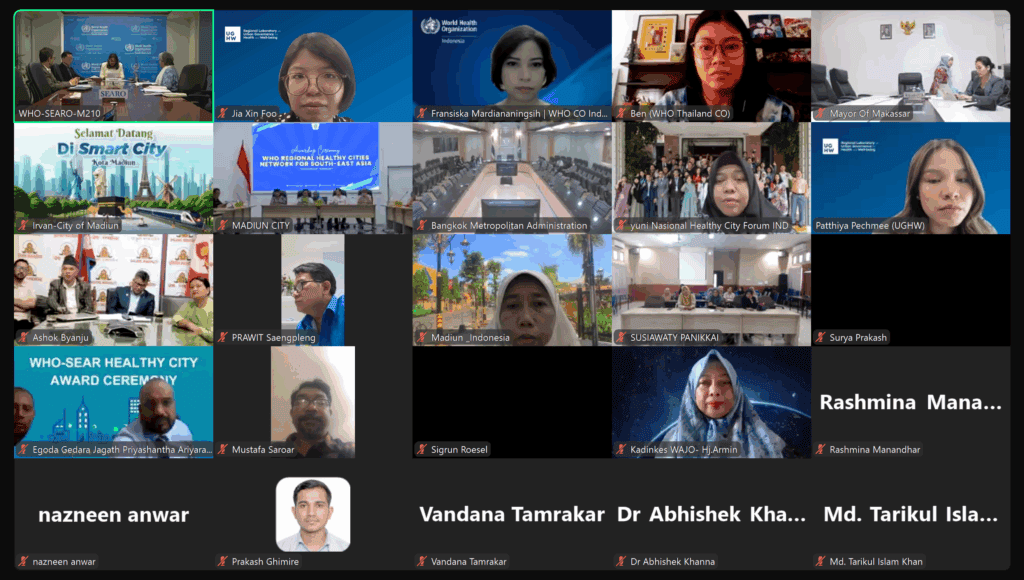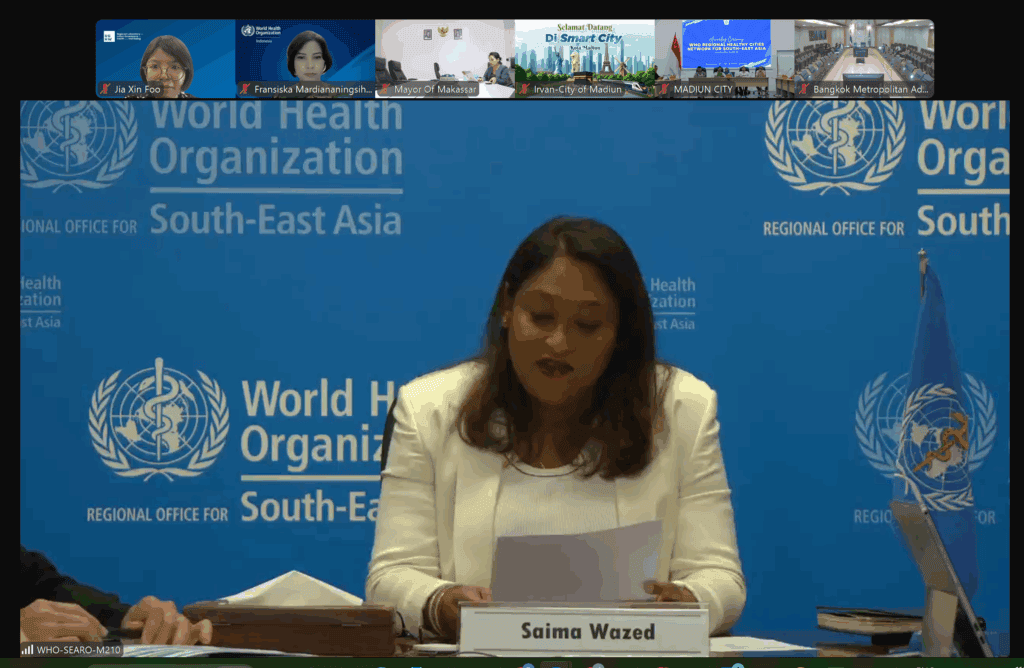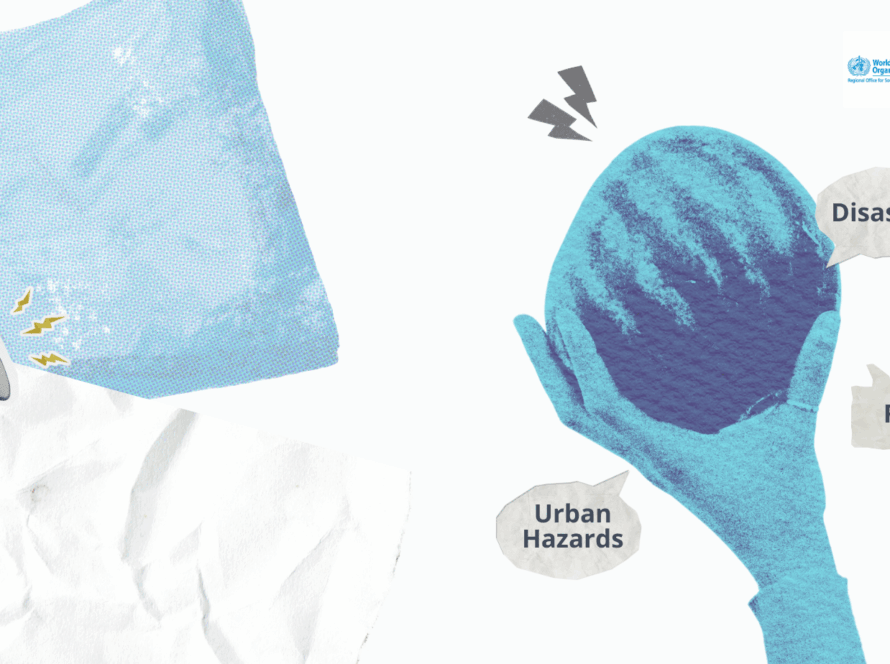The recent Healthy Cities Network Award Ceremony was more than just an awarding event – it was a call to action. On 28 March 2025, the WHO Southeast Asia Regional Office brought together over 120 attendees, including mayors, governors, policymakers, and health officials, to recognize cities that have prioritized public health and sustainable urban development. The ceremony provided a platform for cities across the region to share their unique challenges and successes, fostering regional learning and exchange.
From waste management initiatives in Wajo, Indonesia, to adolescent support programs in Addu, Maldives, the event showcased how cities are embracing innovative strategies to create healthier, more resilient communities, aligning with the WHO Healthy Cities framework.
Honoring Exemplary Cities
Addu, Maldives: Addu City has made significant progress in addressing health challenges faced by adolescents, particularly in fast-growing urban areas. By providing employment opportunities, counseling, and skills training, the city has successfully reduced youth alienation and promoted sustainable livelihoods.
Badulla, Sri Lanka: Badulla Municipal Council has demonstrated strong collaboration with local institutions to control disease outbreaks and promote community health. Initiatives include school health and nutrition programs, as well as intensified dengue surveillance, showcasing the city’s commitment to public health and safety.
Bangkok, Thailand: Bangkok was celebrated for its unwavering commitment to urban health and governance. Deputy Governor Assoc. Prof. Tavida Kamolvej emphasized the city’s dedication to reducing health inequities, particularly for vulnerable populations such as the elderly, children, and the homeless. The Bangkok Metropolitan Administration (BMA) has implemented various initiatives targeting public health, air quality, and access to services, setting a benchmark for other urban centers.
Bansuan, Thailand: Bansuan Municipality in Chonburi Province received accolades for its proactive approach to community health. Municipal Secretary Mr. Prawit Saengpleng highlighted ongoing projects that prioritize health at all life stages, fostering a “City of Happiness” through development initiatives.
Dhulikhel, Nepal: Mayor Ashok Kumar Byanju accepted the recognition for Dhulikhel Municipality’s commitment to integrating health into development plans. Notable projects include gender equality committees and sustainable development initiatives that position Dhulikhel as Nepal’s first recognized healthy city.
Klongchaun, Thailand: Klong-chaun Municipality in Surat Thani Province has launched comprehensive health equity initiatives, targeting vulnerable populations such as the elderly and those in need of long-term care. The city has also developed age-friendly facilities to enhance community engagement and well-being.
Pune, India: Pune Municipal Corporation was lauded for its innovative “Aging with Dignity” program, which addresses elderly care through public-private partnerships. Deputy Medical Officer Dr. Kalpana Baliwant outlined the program’s success in enhancing elderly care and rehabilitation services in urban slums.
Makassar, Indonesia: Makassar City, under Mayor Munafri Ariffudin, has been recognized for integrating health into urban policies through youth and community partnerships. Initiatives include tackling youth unemployment, expanding disability services, and enhancing telemedicine access while prioritizing waste management and connectivity.
Sadao, Thailand: Sadao Municipality demonstrated strong community engagement by addressing pollution, expanding green spaces, and promoting active lifestyles. Municipal Secretary Mr. Khomait Jantong emphasized the city’s efforts to integrate health into urban planning, making it more walkable and livable for residents.
Wajo Regency, Indonesia: Under the leadership of Mrs. Fatmawati Amin Rosman, Wajo Regency has made significant strides in community-based health initiatives, focusing on waste management, food security, and public health awareness. Collaborating with local NGOs and the Healthy City Forum, Wajo Regency has effectively managed waste through community gardens and organic fertilizers, demonstrating how local solutions can foster health, resilience, and inclusiveness.
Affiliated cities were also recognised for their continued commitment and advancement of the Healthy City initiative in the region. These cities include Khulna in Bangladesh; Thimphu in Bhutan; Cilegon, Madiun, Surabaya and Semarang in Indonesia; Chandragiri, Dharan and Lalitpur in Nepal, alongside Jaffna and Kandy from Sri Lanka as well as Banchiewlarn and Kalasin from Thailand.
Embracing Collaboration for Urban Health

During the ceremony, Dr. Suvajee Good, WHO Regional Adviser for Social Determinants of Health and Health Promotion, emphasized the importance of adopting a whole-of-society approach to urban health. She highlighted how the awarded cities exemplify the diversity and resilience of the Southeast Asia region, where urbanization presents both challenges and opportunities for health promotion.
WHO Regional Director Saima Wazed echoed this sentiment, underscoring the role of cities as pivotal drivers of health policy and governance. “Each city is unique, shaped by its circumstances, and today’s awards celebrate progress, not perfection,” she stated, urging cities to maintain momentum in advancing health outcomes.
“The work doesn’t end here. We must keep pushing forward, learning from each other, and creating healthier cities for all,” Saima Wazed concluded.
Following the conclusion of the ceremony, cities in the Network continue their steadfast work to improve governance for health and well-being in their respective priority areas.
Stay connected to learn more about these inspiring urban health initiatives and how the WHO Healthy Cities Network continues to shape the future of sustainable cities across Southeast Asia.




